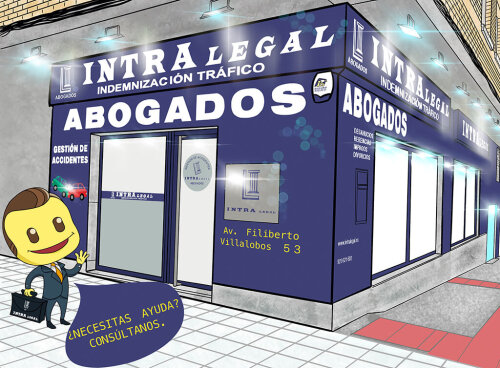Best Real Estate Lawyers in Salamanca
Share your needs with us, get contacted by law firms.
Free. Takes 2 min.
Free Guide to Hiring a Real Estate Lawyer
List of the best lawyers in Salamanca, Spain
Spain Real Estate Legal Articles
Browse our 1 legal article about Real Estate in Spain written by expert lawyers.
- Buying Property in Spain: A Foreigner's Legal Checklist
- Foreigners can freely buy real estate in Spain, but you must obtain an NIE (foreigner tax ID) and usually open a Spanish bank account before completion. Total purchase costs typically add 10-15% on top of the price, mainly in transfer tax (ITP) or VAT plus AJD, plus notary, registry, mortgage,... Read more →
About Real Estate Law in Salamanca, Spain
Salamanca, located in the Castilla y León region, is renowned for its historic charm, academic prestige, and vibrant property market. Real estate in Salamanca encompasses a range of transactions, from buying and selling residential properties to leasing commercial spaces and dealing with rural land. The law that governs real estate in Salamanca is framed under both national Spanish law and regional legislation specific to Castilla y León. Understanding local legal nuances is essential for smooth transactions and to safeguard your interests, whether you are a resident, investor, or business looking to establish a presence in the city.
Why You May Need a Lawyer
There are various situations in which legal guidance is necessary when dealing with real estate in Salamanca. Navigating the intricacies of Spanish property law can be challenging, especially if you are unfamiliar with the language or specific local practices. Here are some common reasons why individuals and businesses seek legal assistance:
- Buying or selling a property and needing to draft or review contracts
- Carrying out due diligence on property ownership, debts, or zoning restrictions
- Resolving disputes regarding boundaries, co-ownership, or inheritance issues
- Negotiating and preparing lease agreements for tenants or landlords
- Managing urban planning, building permits, or development projects
- Understanding tax implications and fulfilling related obligations
Local Laws Overview
Real estate in Salamanca is regulated by several layers of law. The key legislative frameworks are:
- Spanish Civil Code - Outlines general principles regarding property rights and obligations.
- Land Registry Law (Ley Hipotecaria) - Governs the registration of property and encumbrances; essential for verifying ownership and debts.
- Urban Planning Laws - Regional and municipal planning rules set development standards, land usage, and construction permits.
- Law of Horizontal Property - Deals with condominiums and co-ownership of communal spaces.
- Tax Laws - Such as the Impuesto sobre Transmisiones Patrimoniales (ITP, Transfer Tax) and Impuesto sobre Bienes Inmuebles (IBI, local property tax).
Municipal ordinances and special heritage protections also influence what can be done with many buildings, particularly in Salamanca’s historic center, a UNESCO World Heritage Site. Every transaction should include thorough checks to ensure compliance with these local and national rules.
Frequently Asked Questions
Do I need to be a resident to buy property in Salamanca?
No, Spain allows non-residents to purchase property. However, non-EU buyers may have to follow additional administrative steps and taxation rules.
What is the process for buying a property?
Typically, it involves signing a reservation contract, conducting due diligence (often with legal help), signing a private sale contract, and then formalizing the transfer before a notary with registration in the Land Registry.
Are there specific taxes or costs involved in a real estate transaction?
Yes, buyers and sellers are subject to various taxes such as Transfer Tax (ITP) or VAT, Notary fees, Land Registry fees, and municipal taxes like Plusvalía.
How can I verify property ownership and debts?
You can request a "Nota Simple" from the local Land Registry office, which details the property’s registration status, current owner, and any encumbrances or mortgages.
What rights do tenants have in Salamanca?
Spanish law provides strong tenant protections, especially for primary residences, which apply throughout Salamanca. These govern contract duration, deposit limits, rent increases, and eviction processes.
Can I rent my property short-term, such as for tourists?
Short-term tourist rentals are regulated and often require specific licenses from the Salamanca City Council. Fines may be imposed for non-compliance.
What should I know about buying property in Salamanca’s historic center?
Many properties are subject to additional heritage protection rules that restrict renovations or changes to facades and structures. Always verify with the local planning office before proceeding.
Is it necessary to use a notary?
Yes, real estate transactions must be formalized by a public notary for the transfer of ownership to be legally recognized and registrable.
How are inheritance and gifts of property handled?
Inheritance and donation of real estate are subject to local and national succession laws and taxes. It is important to consult a lawyer for guidance on will drafting or property transfer under Spanish law.
What happens if there is a dispute over property boundaries?
Boundary disputes are common and can often be resolved by a legal review of cadastral records, surveys, and mediation. If necessary, formal litigation in local courts is possible, but always consider seeking an amicable resolution first.
Additional Resources
If you need further information or support, consider consulting these resources:
- Registro de la Propiedad de Salamanca - The local Land Registry for title searches and encumbrance checks.
- Ayuntamiento de Salamanca - The Salamanca City Council provides regulations, planning information, and licensing details.
- Colegio de Abogados de Salamanca - The Salamanca Bar Association offers lawyer directories and initial guidance.
- Dirección General de Catastro - Spain’s national Cadastre Office manages property boundaries and records.
- Junta de Castilla y León - The regional government publishes real estate laws, tax rates, and urban planning rules for Salamanca.
Next Steps
If you are planning a real estate transaction or facing a legal issue in Salamanca, these steps can guide you:
- Define your objectives and gather all relevant property documents.
- Consult with a reputable real estate lawyer in Salamanca to explain your needs and assess any risks.
- Request a preliminary review of the property’s legal status, including title, zoning, and outstanding debts.
- Ensure all contracts, whether for sale or lease, are reviewed before signing.
- If dealing with disputes, attempt mediation or negotiation where possible, using legal assistance.
- Register all changes or transactions with the Land Registry and relevant authorities to ensure your rights are protected.
Finding qualified legal help early in the process is the best way to avoid costly mistakes and protect your interests in Salamanca’s real estate market.
Lawzana helps you find the best lawyers and law firms in Salamanca through a curated and pre-screened list of qualified legal professionals. Our platform offers rankings and detailed profiles of attorneys and law firms, allowing you to compare based on practice areas, including Real Estate, experience, and client feedback.
Each profile includes a description of the firm's areas of practice, client reviews, team members and partners, year of establishment, spoken languages, office locations, contact information, social media presence, and any published articles or resources. Most firms on our platform speak English and are experienced in both local and international legal matters.
Get a quote from top-rated law firms in Salamanca, Spain — quickly, securely, and without unnecessary hassle.
Disclaimer:
The information provided on this page is for general informational purposes only and does not constitute legal advice. While we strive to ensure the accuracy and relevance of the content, legal information may change over time, and interpretations of the law can vary. You should always consult with a qualified legal professional for advice specific to your situation.
We disclaim all liability for actions taken or not taken based on the content of this page. If you believe any information is incorrect or outdated, please contact us, and we will review and update it where appropriate.
Browse real estate law firms by service in Salamanca, Spain
Salamanca, Spain Attorneys in related practice areas.












